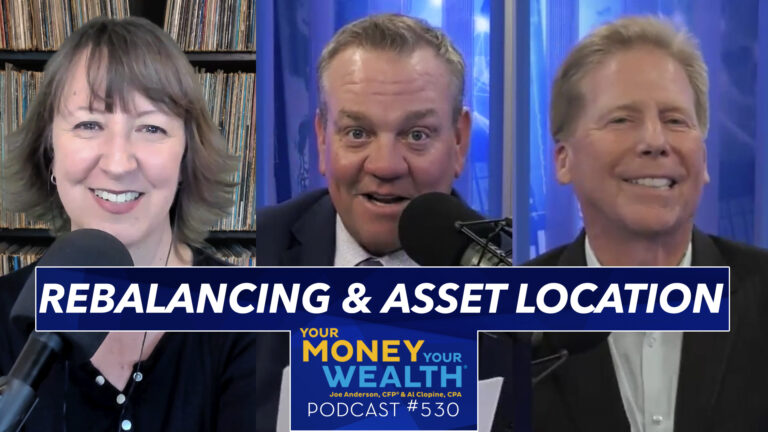A reverse mortgage gives you the opportunity to tap into your home equity to generate retirement income. Joe Anderson, CFP and Big Al Clopine, CPA discuss whether a reverse mortgage is the right move for you in YMYW podcast episode 71. Original publish date October 8, 2016 (hour 1). Note that content may be outdated as rules and regulations have changed.
00:00 – Intro
01:02 – “I’ve got a lot [to explain] about retirement that you need to be aware of, some new tax plan strategies, pros and cons of retiring in your seventies…”
04:44 – “Part of the reason why college is so expensive is because you can borrow money so now colleges are charging more and administrators are paid more.”
13:57 – “Have you ever considered how you will use your home equity in retirement? If you’re going to stay in your home, will you tap into that?”
18:42 – “Home equity has not always been part of the retirement income discussion.”
22:10 – “What happens is either you borrow a lump sum or a payment stream or just a line of credit that you can draw when you need it; so then what happens is you don’t actually make payments – the interest that you would have normally paid just keeps accruing and adding to your loan so when your house is sold, whatever your loan is gets paid off by the equity.”
24:55 – “How do you use a reverse mortgage properly?”
25:28 – “Here’s a way to get cash flow: if you don’t have any in your savings, you can get a home equity line on a reverse mortgage and pay for your bills that way…”
28:54 – “If all your money is sitting in traditional retirement accounts, it’s 100% taxable. For a lot of you, that’s where the majority of your savings are. If there were a way to get control over your taxes, the home equity loan can be a tool if you utilize it with other strategies so you pay less taxes for the rest of your life…there are a lot of ways to reduce taxes in retirement.”
32:55 – “With an IRA or individual retirement account, you can buy stocks, bonds, mutual funds and ETFs. With a MyRA (my retirement account) you’re buying U.S. treasuries.”
Listen to the YMYW podcast:

Amazon Music
AntennaPod
Anytime Player
Apple Podcasts
Audible
Castbox
Castro
Curiocaster
Fountain
Goodpods
iHeartRadio
iVoox
Luminary
Overcast
Player FM
Pocket Casts
Podbean
Podcast Addict
Podcast Index
Podcast Guru
Podcast Republic
Podchaser
Podfriend
PodHero

Podknife
podStation
Podverse
Podvine
Radio Public
Rephonic
Sonnet
Spotify
Subscribe on Android
Subscribe by Email
RSS feed
IMPORTANT DISCLOSURES:
Pure Financial Advisors is a registered investment advisor. This show does not intend to provide personalized investment advice through this broadcast and does not represent that the securities or services discussed are suitable for any investor. Investors are advised not to rely on any information contained in the broadcast in the process of making a full and informed investment decision.
• Investment Advisory and Financial Planning Services are offered through Pure Financial Advisors, LLC, a Registered Investment Advisor.
• Pure Financial Advisors LLC does not offer tax or legal advice. Consult with your tax advisor or attorney regarding specific situations.
• Opinions expressed are not intended as investment advice or to predict future performance.
• Past performance does not guarantee future results.
• Investing involves risk including the potential loss of principal. No investment strategy can guarantee a profit or protect against loss in periods of declining values.
• All information is believed to be from reliable sources; however, we make no representation as to its completeness or accuracy. As rules and regulations change, content may become outdated.
• Intended for educational purposes only and are not intended as individualized advice or a guarantee that you will achieve a desired result. Before implementing any strategies discussed you should consult your tax and financial advisors.
CFP® – The CERTIFIED FINANCIAL PLANNER™ certification is by the Certified Financial Planner Board of Standards, Inc. To attain the right to use the CFP® designation, an individual must satisfactorily fulfill education, experience and ethics requirements as well as pass a comprehensive exam. Thirty hours of continuing education is required every two years to maintain the designation.
AIF® – Accredited Investment Fiduciary designation is administered by the Center for Fiduciary Studies fi360. To receive the AIF Designation, an individual must meet prerequisite criteria, complete a training program, and pass a comprehensive examination. Six hours of continuing education is required annually to maintain the designation.
CPA – Certified Public Accountant is a license set by the American Institute of Certified Public Accountants and administered by the National Association of State Boards of Accountancy. Eligibility to sit for the Uniform CPA Exam is determined by individual State Boards of Accountancy. Typically, the requirement is a U.S. bachelor’s degree which includes a minimum number of qualifying credit hours in accounting and business administration with an additional one-year study. All CPA candidates must pass the Uniform CPA Examination to qualify for a CPA certificate and license (i.e., permit to practice) to practice public accounting. CPAs are required to take continuing education courses to renew their license, and most states require CPAs to complete an ethics course during every renewal period.









